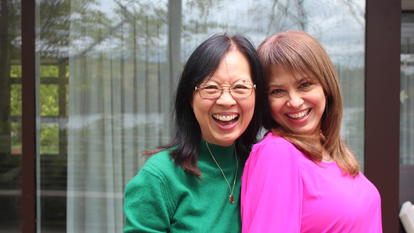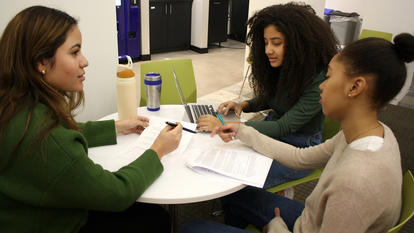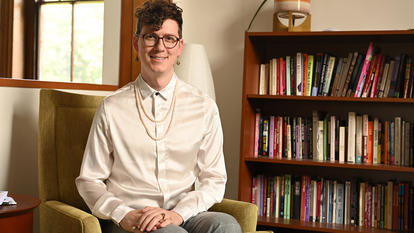
On Black Lives and Black Votes: “We Belong, We Are Here to Contribute,” Says Massachusetts State Rep. Liz Miranda ’02
“We’re smart enough, we belong, [and] we’re here to contribute in a real way,” said Massachusetts state Rep. Liz Miranda ’02 at Black Lives + Black Votes, hosted by Wellesley College on October 7.
The event brought together Miranda, Kellie Carter Jackson, Knafel Assistant Professor of Humanities and assistant professor of Africana studies at Wellesley, and moderator Callie Crossley ’73, award-winning journalist and host of GBH’s Under the Radar and Basic Black, for a #WellesleyVotes conversation about the evolution of the Black Lives Matter movement and how people of color—especially Black women and women of color—are mobilizing around the election to fight systemic racism and push for change.
President Paula A. Johnson introduced the participants before turning the conversation over to Crossley. “I have long believed that Wellesley has an essential role to play as we confront some of the most pressing concerns we face in this moment, both in this country and around the world,” Johnson said. “Tonight, let us again commit to working together as a community to envision the world in which we want to live, and to take action, together, to make it real.”
Crossley began by reflecting that as part of “any conversation about Black lives and Black votes in this moment, we must pause to take a moment of acknowledgement for Breonna Taylor.”
“I think it’s really easy for Black women to be forgotten in a movement that really centers around a lot of violence toward women as well,” said Carter Jackson, author of Force and Freedom: Black Abolitionists and the Politics of Violence. “And so while Breonna Taylor has not yet received justice, we are still fighting for her. We are still advocating for her. I think one of the greatest weapons that we can use in ensuring that she gets justice is making sure that her memory doesn’t die and making sure that her name is remembered in all aspects.”
“People died—died—so that we could get the right to vote, so I take [voting] incredibly seriously, even if I’m not 100 percent enthused about the candidates.”
Kellie Carter Jackson
Miranda, who represents the Fifth Suffolk district, comprising parts of the Dorchester and Roxbury neighborhoods of Boston, said, “When I walked on the campus of Wellesley in 1998, I was very much a similar girl like Breonna Taylor, coming from a similar community. And it’s an honor today to be uplifting her name but also uplifting the over 110 people a year who die based on police violence through no-knock warrants.”
Crossley’s first question was about the historical context of Black Lives Matter (BLM). “If there was ever a moment to talk about a movement for Black lives playing a critical role in this election season, it’s now,” she said.
Carter Jackson compared BLM to the abolitionist movement and its goal to push not just for emancipation, which was a first step, but for equality. “So the 19th century into the early 20th century got the long freedom struggle. Up until today there are different reincarnations [of that struggle],” she said. “It’s evolved, certainly, but the call for equal justice, the call for Black humanity, the fight against white supremacy is ongoing and has been so for the past 400 years—and I don’t think that it’s necessarily different, at least in terms of its themes or ideas for full Black humanity and citizenship.”
Crossley asked what is at stake today, in an election year: “What is my vote worth, why should a person of color be engaged?” Miranda said in running for office, she has learned that “people have a lot of righteous anger—when you have not been seen or heard, you’ve been devastated, you’ve been brutalized, you’ve been mass incarcerated, you’ve been over-policed, you’ve been under-educated.”
“People died—died—so that we could get the right to vote, so I take it incredibly seriously, even if I’m not 100 percent enthused about the candidates,” said Carter Jackson. “You take it very, very seriously because people’s lives are on the line. Literally lives and livelihood are on the ballot, when we go to vote.”
Miranda also addressed voter turnout and voter suppression. “Folks have this image of voter suppression as someone standing there, blocking the polling booth,” she said. “But suppression looks like a lack of language access: Over 52 percent of the people who live in my district speak another language and are foreign-born. Literacy: There are many who can’t read ballots. They don’t understand the voting process, and even for able-bodied, English-speaking folks, the voting process is still hard. In my election, I knew that as a homegirl for my community that I would have to do more.”
When asked about the roles of Black women, and how they are mobilizing ahead of this election, Carter Jackson said, “Black women have to constantly hold [politicians’] feet to the fire, to remind people, ‘Listen, we can go in another direction.’” She said it is disappointing that “neither party has really been progressive, neither party has really put Black interests at the forefront, and neither party has really made significant rapid strides in terms of how we understand liberation, ultimate liberation.”
She described a shift she has seen with Black women, who “have taken up the position where it’s like, ‘No, we’re no longer voting for these people. We’re becoming these people, and you can vote for us.’”
Toward the end of the conversation, Crossley asked Miranda and Carter Jackson, “What’s the charge to Wellesley College students, or young people in general?”
Carter Jackson said she always tells her students to be activists, to take the knowledge and information they are getting at Wellesley and act on it. “Be committed to justice, be committed to helping the marginalized and the oppressed,” she said, and when you have success, “lift and climb; our goal is to constantly lift and climb and bring others along.”
“When I looked up at those signs that said ‘Women Who Will’ during my time at Wellesley, I took it literally—women who will make a difference in the world,” said Miranda. She encouraged students to vote at home or to register in Massachusetts if they are in the state for more than eight months of the year, and to be actively involved in the election: “I know we’re in a pandemic, but can you make calls? Can you knock and run? Can you leaflet? Can you put up posters? Can you sign up to be a poll worker? Can you translate? Can you give rides? I think folks feel very sort of stuck on, ‘What can I really do? Can I contribute?’ And you can contribute a lot by not being a bystander.”



